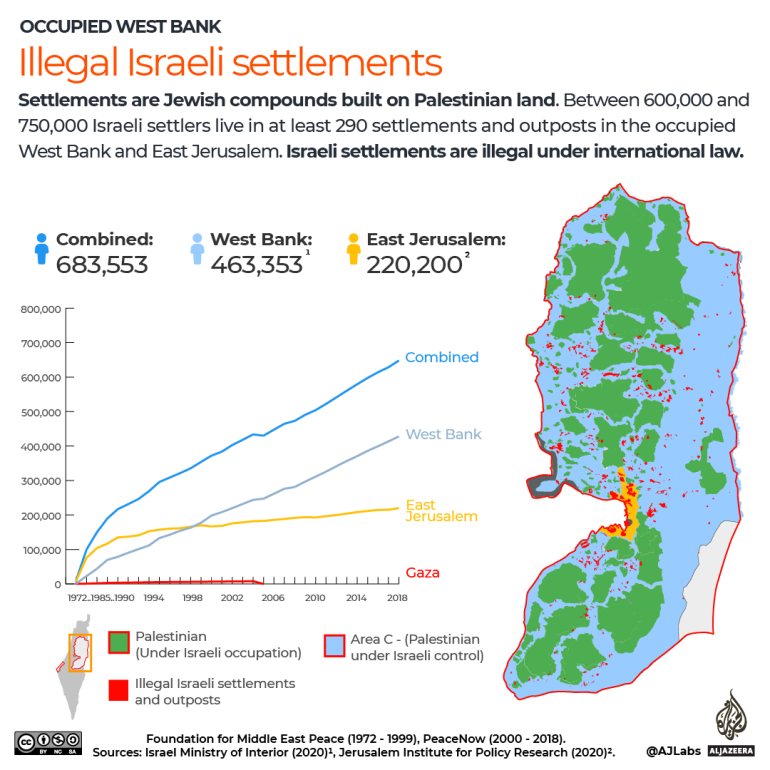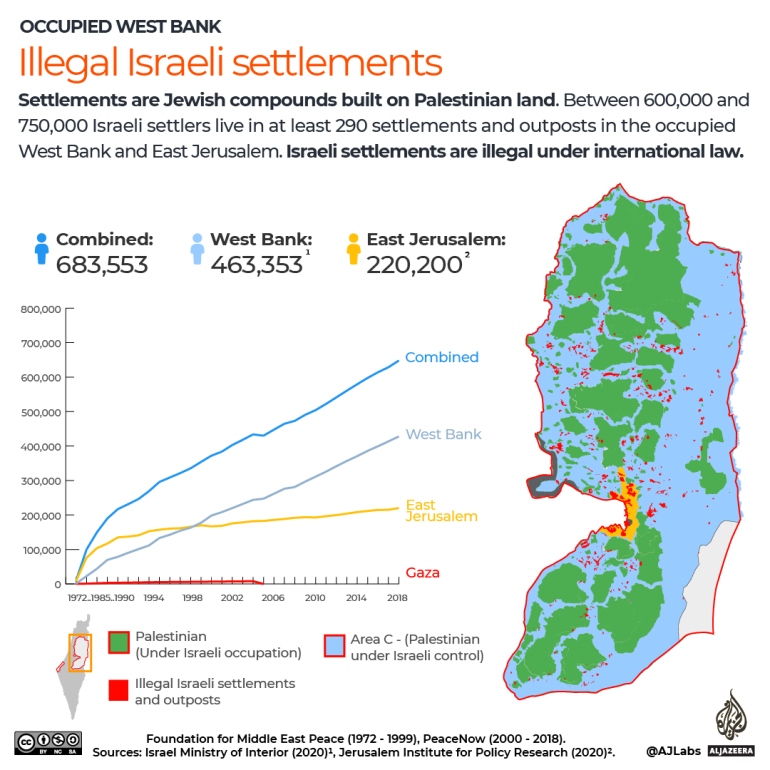Two bills aimed at annexing the occupied West Bank have limped through Israel’s parliament, the Knesset, on Tuesday night in defiance of both the United States and Prime Minister Benjamin Netanyahu’s governing Likud party.
Responding to news of the vote, US President Donald Trump said simply, Israel is “not going to do anything with the West Bank”.
Recommended Stories
list of 4 itemsend of list
Meanwhile, his vice president, JD Vance, who was in Israel to safeguard the ceasefire that the US brokered for Gaza earlier this month, went further, describing the vote as “weird” and adding, “I personally take some insult to it.”
The occupied West Bank, along with East Jerusalem and the Gaza Strip, has been under Israeli military occupation since 1967. Since then, Israeli settlements have continued to be built, despite being illegal under international law, and, in the case of settlement outposts, under Israeli law as well.
There are currently about 700,000 Israeli settlers living in 250 illegal settlements on Palestinian land in the West Bank and East Jerusalem combined. About half a million of these are in the West Bank.

While annexation of the West Bank has long been a goal for many members of Israel’s right wing, it is not yet the official position of the Israeli government – and this new bill has yet to be made law.
For Zionists, annexing the West Bank officially would be a key step towards restoring what they see as the biblical land of Greater Israel, which encompasses all the occupied Palestinian territories as well as parts of Lebanon, Syria, Jordan and Egypt. For others, it is a means of seizing Palestinian land cheaply and preventing any future Palestinian statehood.
Advertisement
In July, the Knesset passed a symbolic motion in favour of “applying Israeli sovereignty to Judea, Samaria and the Jordan Valley” – the Israeli names for the occupied West Bank. While the motion carried no legal weight, a month later, Israel announced the creation of a new settlement, “E1“, linking occupied East Jerusalem to the expanding Maale Adumim settlement in the occupied West Bank.
What were the recent Israeli bills about?
The Knesset voted on two separate bills on Tuesday: one to legally annex the Maale Adumim settlement and another to apply Israeli sovereignty to all illegal settlements in the occupied West Bank.
Introducing the second bill, its sponsor, far-right Member of Knesset (MK) Avi Maoz of the one-man Noam party, framed the move in biblical terms. “The Holy One, blessed be He, gave the people of Israel the Land of Israel,” Maoz told the Knesset. “Settlement in the Land of Israel is the redemption and national revival … after two thousand years of exile.”
How did the votes go?
Both bills passed their preliminary readings. The bill to annex Maale Adumim, sponsored by opposition leader Avigdor Lieberman, passed 32–9. The broader sovereignty bill passed narrowly, 25–24.
According to Israeli media, almost all lawmakers from Netanyahu’s Likud party boycotted the votes, with only one MK voting in support.

Who supported and opposed the bills?
In line with the US administration, some of whose most senior figures are currently in Israel to shore up the ceasefire agreement they brokered in early October, Netanyahu and Likud opposed both bills.
While Netanyahu has previously paid lip service to the notion of a “Greater Israel”, his party dismissed the votes as “another provocation by the opposition aimed at damaging our relations with the United States”.
US President Donald Trump has stated that he will prevent the annexation of the West Bank, cutting off US support for Israel if necessary to ensure it does not go ahead.
Anticipating suggestions that Netanyahu’s government has handed too much authority to the US, it said in a statement: “True sovereignty will be achieved not through a showy law for the record, but through proper work on the ground.”
Just one Likud MK, Yuli Edelstein, voted in favour – a move that has now cost him his seat on the Knesset’s Foreign Affairs and Defense Committee.
However, some of Netanyahu’s coalition partners backed the measures, notably Religious Zionist Finance Minister Bezalel Smotrich and far-right National Security Minister Itamar Ben-Gvir.
Advertisement
In a post on X, Smotrich wrote: “Mr Prime Minister, the Knesset has spoken. The people have spoken. The time has come to apply full sovereignty over all the territories of Judea and Samaria – the inheritance of our forefathers – and to promote peace agreements in exchange for peace with our neighbours, from a position of strength.”
Also supporting the bill to annex Maale Adumim were opposition figureheads Benny Gantz and Yair Lapid, two figures who are regularly portrayed as liberal or moderate in the European media.
Does the timing of this matter?
For Netanyahu, Likud and their American guests, it’s awkward.
On Thursday, Israel’s media reported the news that the army would be required to gain clearance from the US before launching any new strikes on Gaza. A day earlier, Time published an interview with Trump in which he stated that he had instructed the Israeli Prime Minister Benjamin Netanyahu that he would not be allowed to annex the occupied West Bank.
Netanyahu has pushed back against suggestions that Israel has become a US “client state”.
Netanyahu has nevertheless gone to pains to accommodate his US visitors, including US Vice President JD Vance – who called the Knesset bills “a very stupid political stunt” – Secretary of State Marco Rubio, presidential son-in-law Jared Kushner and special envoy Steve Witkoff.
All have been dispatched to Israel to shore up the ceasefire that the president has invested much of his political capital in and that, according to reports in The New York Times, US officials suspect that Netanyahu is looking for an excuse to break.
As Vice President Vance clarified at a news conference, they were there to oversee the fragile cease-fire deal in Gaza and not to “monitor a toddler”.
What happens with the bills next?
The bills will now be referred to the Knesset’s Foreign Affairs and Defense Committee for further consideration and must pass three additional readings before they can become law.
However, given the hard US line on halting further Israeli aggression, Netanyahu is very unlikely to allow either bill to advance further, a view echoed by much of the Israeli media.
So, are these votes at all significant?
As long as Netanyahu, his governing coalition and Washington oppose the bills, neither is expected to become law. However, in the broader context of Israel’s occupation of Palestinian territory since 1967, the votes mark another step in the gradual encroachment of Israeli control over Palestinian territory.
The decade following the 1967 war saw rapid settlement expansion, followed by the annexation of East Jerusalem in 1980. The 1993 Oslo Accords fragmented Palestinian land, while the 2005 Gaza disengagement – pitched as a liberal reform – tightened Israeli control elsewhere.
Advertisement
Subsequent years saw continued settlement growth and the 2018 Nation-State Law, which codified Israelis’ exclusive right to self-determination – all pointing towards the de facto annexation of occupied Palestinian territory.
